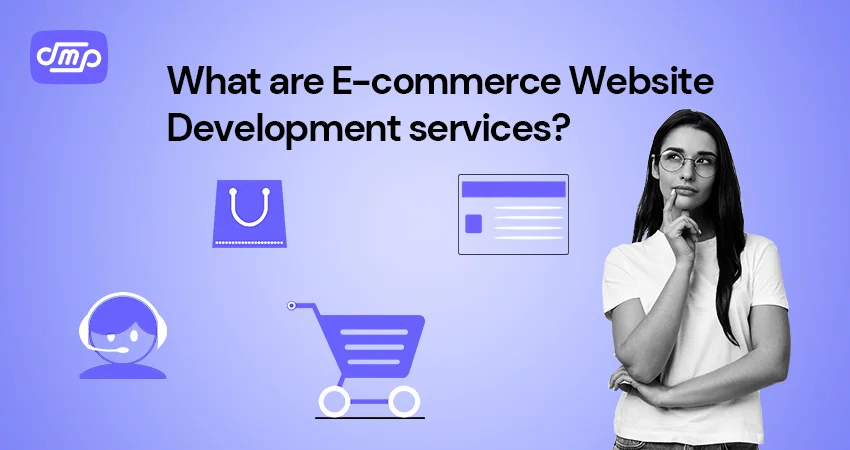
- July 1, 2023
- seo, website design
- Web development
What are E-Commerce Website development services?
Selling goods or services online through websites is referred to as e-commerce websites. A shopping cart, product catalogue, checkout process, and secure payment processing are common components of e-commerce website development services. Without a physical storefront, these websites enable firms to offer goods around-the-clock to a global audience.
The following elements are typically present in an e-commerce website development services:
- Product Catalog: A product catalogue is a list of the goods and services a company sells. The catalogue typically includes product descriptions, prices, and images.
- Shopping Cart: The shopping cart is a digital container that holds the products the customer has selected to purchase.
- Checkout Process: The checkout process is a sequence of procedures that the customer goes through to finish their transaction. This includes entering their shipping and billing information, selecting a shipping method, and reviewing their order before making a payment.
- Payment Gateway: A secure service is known as a payment gateway that handles customer payments. It typically involves a credit or debit card transaction, but may include other payment methods.
- Order management: The order management system takes over when a customer has finished making a transaction. This includes sending an order confirmation to the customer, updating inventory levels, and notifying the company of the sale.
A variety of platforms, including open-source platforms like WooCommerce, can be used to create e-commerce websites.
What are different E-commerce website models?
There are several various e-commerce website models, each with special qualities and benefits. Some of the most popular e-commerce website models are listed below:
- Business-to-Consumer (B2C) Model: In this type of company arrangement, consumers are the direct buyers of goods or services. Websites like Amazon and Flipkart are examples of this paradigm, which is the most prevalent in e-commerce.
- Business-to-business (B2B) model: Businesses sell goods or services to other businesses in the business-to-business (B2B) model. Websites like Alibaba and Global Sources fall under this approach, which is frequently utilised for wholesale and bulk orders.
- Consumer-to-Consumer (C2C) Model: In this model, customers deal directly with other consumers to sell goods or services. Peer-to-peer marketplaces, which include websites like Quikr and Olx, frequently employ this model.
- Consumer-to-Business (C2B) Model: Consumers sell goods or services to businesses in the consumer-to-business (C2B) paradigm. Websites like Upwork and Fiverr are examples of those that employ this approach and are frequently used by consultants and freelancers.
- Subscription model: Customers pay a regular price to access goods or services under the subscription model. Websites like Netflix and Adobe adopt this strategy, which is popular among streaming services and software as a service (SaaS) providers.
- White Label Model: In this approach, a company creates a product or service that is offered under another company’s brand name. Websites like Kroger and Target are examples of places that use this business model frequently for private-label goods.
- Dropshipping Model: Using this approach, companies may sell goods without actually keeping any stock. Instead, the customer receives the goods directly from the manufacturer. Websites like Oberlo and Spocket employ this strategy frequently for speciality products.
Importance of E-commerce website

An e-commerce website can be incredibly important for a business for several reasons:
- Reach a Global Audience: e-commerce website development services allow businesses to reach customers around the world, 24/7. This widens the possible consumer base beyond the local area, boosting the business’s market reach.
- Lower Overhead Costs: e-commerce websites can significantly lower overhead costs compared to a physical storefront. Without the need for a physical location, businesses can save on rent, utilities, and other expenses associated with maintaining a brick-and-mortar store.
- Convenient Shopping Experience: An e-commerce website provides customers with a convenient shopping experience. Instead of physically visiting a store, customers can shop from the convenience of their homes or while on the go using mobile devices.
- Personalized marketing campaigns: e-commerce websites have the ability to gather information about the buying patterns, tastes, and interests of their users. This data can be used to create personalized marketing campaigns, improving customer engagement and increasing sales.
- Increase Sales: An e-commerce website can improve sales by offering clients a broader selection of items or services, and by delivering a streamlined purchasing experience. Increased customer satisfaction, loyalty, and favourable word-of-mouth recommendations may result from this.
- Insights and Analytics: e-commerce websites provide businesses with access to valuable insights and analytics. This includes information on consumer behaviour, shopping habits, and product performance, all of which can be used to guide business decisions and boost productivity.
What are different E-commerce websites?

There are many distinct sorts of e-commerce websites, catering to a wide range of sectors and markets. Here are some of the most common types of e-commerce websites:
- General e-commerce Websites: These are extensive e-commerce sites, like Amazon and eBay, that sell a variety of goods.
- Niche websites: e-commerce websites that target particular markets or niches, including fashion, cosmetics, or home items, are known as niche websites. Examples include Sephora and ASOS.
- Service-based e-commerce websites: e-commerce websites that sell services, such as travel or event planning. Eventbrite and Airbnb are two examples.
- Subscription e-commerce Websites: These are e-commerce sites that give users access to recurring goods or services, such as food delivery or streaming services. Example Netflix.
- Marketplace e-commerce Websites: These are e-commerce websites that allow multiple sellers to offer their products or services in one place, such as Etsy and Fiverr.
- Social e-commerce sites: Websites that sell goods through social media channels, such as Instagram and Facebook Marketplace, are referred to as social e-commerce sites.
- Business-to-Business e-commerce websites: These are websites that sell goods and services to other businesses. They are geared towards businesses. Global Sources and Alibaba are two examples.
How to choose the best E-commerce website design agency in India?
Choosing the best e-commerce website design agency in India can be a critical decision for the success of your online business. Here are some key factors to consider when selecting an e-commerce website design agency:
- Experience: Look for a company that has a track record of creating successful e-commerce websites. Check their portfolio and client testimonials to see if they have experience working in your industry.
- Expertise: Be sure the agency has expertise in the e-commerce platform you plan to utilise, such as Shopify, WooCommerce, Magento, or custom platforms. They should also have experience in designing user-friendly interfaces, implementing payment gateways, and optimising the website for search engines.
- Communication: Communication is key in any business relationship. Choose a company that has responsive, open, and unambiguous communication channels. You should be able to express your thoughts and needs clearly, get timely updates, and get feedback.
- Budget: While choosing an e-commerce website design company, take your budget into account. Get the most for your money, but don’t skimp on quality in an effort to cut costs.
- Support: Verify that the company offers continuous support and upkeep for your e-commerce website. This covers bug fixes, security updates, and technical support.
- Cultural Fit: Choose an agency that aligns with your company’s culture and values. This can guarantee a friendly and effective working environment.
- Reviews and Reputation: Verify the agency’s internet reviews and reputation to make sure they have a solid standing in the community of clients and in the industry.
Guide to E-commerce website development services
For businesses wishing to create an online presence and conduct online sales, e-commerce website development services are crucial. A guide to e-commerce website development services is provided below:
- E-commerce Platform Selection: Choosing the best e-commerce platform is the first step in developing an e-commerce website. There are numerous well-known platforms, including Magento, WooCommerce, and Shopify. You must pick a platform that works for your company’s needs and budget.
- Website Design: A user-friendly and aesthetically pleasing website design is essential for drawing in new clients and keeping existing ones. Professional website design services that complement your business identity and target market should be part of e-commerce website development services.
- Integration of the payment gateway: The building of an e-commerce website must include payment gateway integration. Integration of secure, dependable, and platform-compatible payment gateways should be part of e-commerce website development services.
- Product Catalog Management: Managing and displaying your products on the website requires an effective product catalogue management system. The creation and administration of systems for managing product catalogues and inventories should be part of e-commerce website development services.
- Creation of a shopping cart system: An e-commerce website’s shopping cart system is a crucial element. The creation of a reliable shopping cart system that is user-friendly and safe should be part of the e-commerce website development.
- Integration of Shipping and Tax Calculations: Integrating shipping and tax calculations that are compatible with the chosen e-commerce platform should be part of the development services for e-commerce websites.
- Applying security measures: Any e-commerce website’s primary concern should be security. To protect against cyber risks, e-commerce website creation services should integrate security measures including SSL certification, firewalls, and recurring security audits.
- Analytics and Reporting: Implementing analytics and reporting tools to monitor website traffic, sales, and consumer behaviour should be part of e-commerce website development services. Website and marketing tactics can be optimized using this information.
- Maintenance and Support: To make sure the website is operating properly and any problems are immediately fixed, e-commerce website development services should include ongoing maintenance and support.
Conclusion
Every e-commerce model has advantages and disadvantages of its own, so companies should carefully assess which model best suits their objectives and target market. Ultimately, an e-commerce website may be a strong tool for firms aiming to expand their reach and improve sales. An e-commerce website can be a strong tool for businesses trying to grow their reach, increase revenue, and improve consumer interaction.
It is crucial for businesses to thoroughly analyze their aims and target audience when designing an e-commerce strategy, to ensure the website is optimized for success. Businesses can choose the best e-commerce website development services that fit their needs, goals, and budget by taking these criteria into account.











